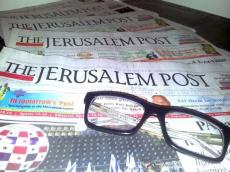Today.Az » Analytics » Jerusalem Post exposes French ambassador’s ignorance on Azerbaijani Heritage
06 December 2024 [13:47] - Today.Az

France has once again become the target of its own provocative actions in the region. As the saying goes, what goes around comes back around. A few weeks ago, the French ambassador to Armenia, Olivier Decottignies, posted on his X that the Blue Mosque, one of the architectural gems of Azerbaijan, belongs to Persian architecture, which aroused great interest. This information even became the centre of public condemnation, focusing all attention on the distorted information of the French ambassador. The issue did not remain quiet and unspoken as it seemed. The response from the prominent Israeli publication The Jerusalem Post once again revealed Decottirnies' ignorance of history. In a previous article published in AzerNEWS, we provided extensive information about the history of the mosque and touched upon details about Armenian attempts to erase and distort history. Thus, to erase Azerbaijani heritage in Armenia, these mosques were renamed as Persian mosques. So, until the Russian Empire invaded modern Armenia, the region was known as the Irevan Khanate. As mentioned in the previous article, the Irevan Khanate was a semi-independent city-state affiliated with the Iranian Empire, ruled by an Azerbaijani dynasty. After the invasion in 1828, the Russian Empire settled Armenians from Iran and later from the Ottoman Empire in the region to create a Christian enclave within the Muslim community. This enclave eventually evolved into modern Armenia. Besides, in the 1980s, during the Soviet era, over 250,000 Azerbaijanis comprised the second-largest ethnic group after Armenians in the country. However, Armenia aimed to seize additional territories, particularly Garabagh, from Azerbaijan under the guise of self-determination. Azerbaijanis in Armenia posed the biggest challenge to this objective, as they could demand the same right of self-determination. To address this, Armenia forcibly deported all Azerbaijanis, as well as Muslim Kurds, from the country between October 1987 and mid-February 1988. Following these deportations, Armenian residents of Garabagh began protests in Khankendi, which escalated into a full-scale war. As for the post by The Jerusalem Post, the publication touches on the exact facts in the article of the prominent Israeli scholar Mordechai Kedar: France’s ambassador sparks outrage with support for Persian hegemony in Armenia. "The Blue Mosque in Yerevan was built by Azerbaijanis, and the French ambassador's attempts to portray the mosque as “Persian” demonstrate France’s support for Persian colonialism in the region," the post reads. In fact, when talking about the blossoming of the Persian regime in Iran or the current Persianization policy in the region, we can cite France as an example. In 1979, France changed its skin and formed its own product, the Persian mullah regime, in the Middle East, reflecting a clear example of its neo-colonialist policy. We can talk about history at length, but if we briefly note that the basis of French and Persian sympathy goes back to the Napoleonic era. But France's rise of interests in Iranian lands and the expansion of its colonialist policy began to strengthen precisely after the collapse of the Tsarist Russian Empire in 1917. France, which was engaged in the struggle for the split of lands of Islamic countries, took steps towards those lands by establishing a mobile hospital in Urmia from those times. The synthesis of French and Persian ideologies began to form rapidly from that time and deepened its roots in our geography. Mr Mordechai Kedar in his opinion on The Jerusalem Post, literally aiming the word at the target, described the distortion of the French ambassador in a completely open sense. Ambassador Decottignies is clearly using Iran's name to carry out a provocative policy in the region. He is trying to involve Iran in the issue by presenting the West Azerbaijani community, which was once expelled en masse from today’s Yerevan, in a provocative manner. However, although Olivier Decottignies did not see what happened in the 1980s, he knows very well that the facts he tries to hide are true.
|